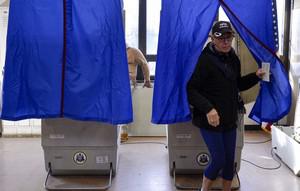CybersecurityDHS designate U.S. election infrastructure as a Critical Infrastructure Subsector
The Department of Homeland Security has added the U.S. election infrastructure to the list of protected critical infrastructure sectors of the economy. The move comes in the wake of the Russian government’s interference in the 2016 presidential election, which was aimed to help Donald Trump win the election. “I have determined that election infrastructure in this country should be designated as a subsector of the existing Government Facilities critical infrastructure sector. Given the vital role elections play in this country, it is clear that certain systems and assets of election infrastructure meet the definition of critical infrastructure, in fact and in law,” DHS secretary Jae Johnson said Friday:

Elections must have security and secrecy to preserve confidence // Source: theconversation.com
The Department of Homeland Security has added the U.S. election infrastructure to the list of protected critical infrastructure sectors of the economy. The move comes in the wake of the Russian government’s interference in the 2016 presidential election, which was aimed to help Donald Trump win the election.
“I have determined that election infrastructure in this country should be designated as a subsector of the existing Government Facilities critical infrastructure sector. Given the vital role elections play in this country, it is clear that certain systems and assets of election infrastructure meet the definition of critical infrastructure, in fact and in law,” DHS secretary Jae Johnson saidFriday:
“I have reached this determination so that election infrastructure will, on a more formal and enduring basis, be a priority for cybersecurity assistance and protections that the Department of Homeland Security provides to a range of private and public sector entities,” Johnson added. “By ‘election infrastructure,’ we mean storage facilities, polling places, and centralized vote tabulations locations used to support the election process, and information and communications technology to include voter registration databases, voting machines, and other systems to manage the election process and report and display results on behalf of state and local governments.”
Johnson noted that DHS had consulted many state and local election officials, and said he was aware of the fact that that many of them are opposed to the designation. “It is important to stress what this designation does and does not mean. This designation does not mean a federal takeover, regulation, oversight or intrusion concerning elections in this country. This designation does nothing to change the role state and local governments have in administering and running elections,’ he said.
The designation of election infrastructure as critical infrastructure subsector means that election infrastructure becomes a priority within the National Infrastructure Protection Plan. It also enables DHS to prioritize its cybersecurity assistance to state and local election officials, but only for those who request it.
“Particularly in these times, this designation is simply the right and obvious thing to do,” Johnson said.
At present, there are sixteen critical infrastructure sectors, including twenty subsectors that are eligible to receive prioritized cybersecurity assistance from DHS. The existing critical infrastructure sectors are:
- Chemical
- Commercial Facilities
- Communications
- Critical Manufacturing
- Dams
- Defense Industrial Base
- Emergency Services
- Energy
- Financial Services
- Food and Agriculture
- Government Facilities
- Healthcare and Public Health
- Information Technology
- Nuclear Reactors, Material, and Waste
- Transportation Systems
- Water and Wastewater Systems
Many critical infrastructure sectors include assets and systems owned and operated by state and local governments, such as dams, healthcare and public health, and water and wastewater systems.
“Election infrastructure is vital to our national interests, and cyberattacks on this country are becoming more sophisticated, and bad cyber actors – ranging from nation states, cyber criminals, and hacktivists – are becoming more sophisticated and dangerous,” Johnson said.
Johnson noted that just as the continually evolving digital age has improved people’s quality of life, it has also introduced an array of cyber threats and implications.
